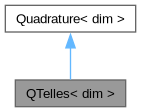 |
Reference documentation for deal.II version 9.6.0
|
 |
Reference documentation for deal.II version 9.6.0
|
#include <deal.II/base/quadrature_lib.h>

Public Member Functions | |
| QTelles (const Quadrature< 1 > &base_quad, const Point< dim > &singularity) | |
| QTelles (const unsigned int n, const Point< dim > &singularity) | |
| QTelles (const Quadrature< 1 > &base_quad, const Point< 1 > &singularity) | |
Telles quadrature of arbitrary order.
The coefficients of these quadrature rules are computed using a non linear change of variables starting from a Gauss-Legendre quadrature formula. This is done using a cubic polynomial, n = a x^3 + b x^2 + c x + d in order to integrate a singular integral, with singularity at a given point x_0.
We start from a Gauss Quadrature Formula with arbitrary function. Then we apply the cubic variable change. In the paper, J.C.F.Telles:A Self-Adaptive Co-ordinate Transformation For Efficient Numerical Evaluation of General Boundary Element Integrals. International Journal for Numerical Methods in Engineering, vol 24, pages 959–973. year 1987, the author applies the transformation on the reference cell [-1, 1] getting
\begin{align*} n(1) &= 1, \\ n(-1) &= -1, \\ \frac{dn}{dx} &= 0 \text{ at } x = x_0, \\ \frac{d^2n}{dx^2} &= 0 \text{ at } x = x_0 \end{align*}
We get
\begin{align*} a &= \frac{1}{q}, \\ b &= -3 \frac{\bar{\Gamma}}{q}, \\ c &= 3 \frac{\bar{\Gamma}}{q}, \\ d &= -b, \end{align*}
with
\begin{align*} \eta^{*} &= \bar{\eta}^2 - 1, \\ \bar{\Gamma} &= \sqrt[3]{\bar{\eta} \eta^{*} + |\eta^{*} | } + \sqrt[3]{ \bar{\eta} \eta^{*} - |\eta^{*} | } + \bar{\eta}, \\ q &= (\Gamma-\bar{\Gamma})^3 + \bar{\Gamma} \frac{\bar{\Gamma}^2+3}{1+3\bar{\Gamma}^2} \end{align*}
Since the library assumes [0,1] as reference interval, we will map these values on the proper reference interval in the implementation.
This variable change can be used to integrate singular integrals. One example is f(x)/|x-x_0| on the reference interval [0,1], where x_0 is given at construction time, and is the location of the singularity x_0, and f(x) is a smooth non singular function.
Singular quadrature formula are rather expensive, nevertheless Telles' quadrature formula are much easier to compute with respect to other singular integration techniques as Lachat-Watson.
We have implemented the case for dim = 1. When we deal the case dim >1 we have computed the quadrature formula has a tensorial product of one dimensional Telles' quadrature formulas considering the different components of the singularity.
The weights and functions for Gauss Legendre formula have been tabulated up to order 12.
Definition at line 528 of file quadrature_lib.h.
| QTelles< dim >::QTelles | ( | const Quadrature< 1 > & | base_quad, |
| const Point< dim > & | singularity ) |
A constructor that takes a quadrature formula and a singular point as argument. The quadrature formula will be mapped using Telles' rule. Make sure that the order of the quadrature rule is appropriate for the singularity in question.
Definition at line 1103 of file quadrature_lib.cc.
| QTelles< dim >::QTelles | ( | const unsigned int | n, |
| const Point< dim > & | singularity ) |
A variant of above constructor that takes as parameters the order n and location of a singularity. A Gauss Legendre quadrature of order n will be used
Definition at line 1120 of file quadrature_lib.cc.
| QTelles< 1 >::QTelles | ( | const Quadrature< 1 > & | base_quad, |
| const Point< 1 > & | singularity ) |
Definition at line 1129 of file quadrature_lib.cc.